Apr 2018 1st Edition
Apr 2018 1st Edition Londekile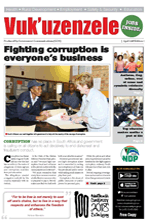
Translations
SADC responds to Listeriosis
SADC responds to Listeriosis LondekileSouthern African Development Community (SADC) ministers of health have agreed on a course of action to mitigate the outbreak of Listeriosis in the region.
This action includes the harmonisation, procedures of prevention, detection and response across the region.
This will see SADC member states working together to strengthen inter-ministerial actions at border posts, inter-sectoral and multi-sectoral co-ordination, effective communication in public health as well as hazard risk assessments for the outbreak.
“We have called on the [SADC] Secretariat to facilitate experience sharing and information exchange between member states. We have also requested the support of international and regional partners like the World Health Organisation to support capacity building for member states,” said Health Minister Dr Aaron Motsoaledi.
The Minister was speaking in his capacity as the chair of SADC Health Ministers at a meeting in Gauteng. The meeting also looked at preventing a trans-border outbreak of listeriosis.
An outbreak of the food-borne disease was identified in June 2017 in South Africa and has claimed 180 lives while 940 listeriosis cases have been reported in the country.
The regional ministers also agreed to strengthen the control of food industries in terms of compliance to food safety standards, as well as the enforcement of policies that are aligned to international codes as well as public education of the disease.
SADC member countries comprise Angola, Botswana, Democratic Republic of Congo, Lesotho, Madagascar, Malawi, Mauritius, Mozambique, Namibia, Seychelles, Swaziland, Tanzania, Zambia and Zimbabwe.
Africa's first phamacy ATM revolutionises public health care
Africa's first phamacy ATM revolutionises public health care lebangAlexandra residents can now get their chronic medicines at the touch of a button, thanks to Africa’s first ‘ATM pharmacy’.
In mid-March, the Gauteng Department of Health launched the revolutionary Pharmacy Dispensary Unit (PDU) in the sprawling township situated in the north of Johannesburg. It will reduce congestion at the surrounding public health care facilities and allow patients to get their chronic medicines and be on their way within minutes.
Speaking at the launch of the PDU, Gauteng Health MEC Dr Gwen Ramokgopa said that the state-of-the-art system will dramatically reduce waiting times and will also improve the public health care system.
“We are revolutionising things and moving with the times; the ATM pharmacy will  modernise the public health care system.
modernise the public health care system.
“We know that one of our biggest problems is long waiting times and queues at clinics and hospitals, and we are confident that this will soon become a thing of the past,” said Ramokgopa.
There are already 400 000 patients in Gauteng who receive their medicines offsite, from stand-alone and retail pharmacies, as part of the provincial government’s efforts to relieve congestion at clinics.
The MEC said initiatives like offsite medicine collection and electronic dispensing are examples of what the future holds for the public health care sector.
The PDU was launched in partnership with private health companies and non-profit organisations, including Right-To-Care and Right e-Pharmacy. A team from Germany assisted with the development of the technology.
The system is run by qualified pharmacists and pharmacy assistants and integrates with the clinical management at public facilities of patients with chronic conditions.
- When using the ATM pharmacy, patients need to have their bar-coded green ID, smart ID card or their pharmacy card scanned into the system.
- They will then need to enter their pin number into the ATM. The system will connect them to a remote pharmacist who will help them, while the machine reads the prescription.
- Shortly after this, the robotic machine will label and dispense the medication, which will be dropped in the collection slot.
- A receipt will also be printed for the patient which will indicate the next collection date. In addition, prescription collection reminders will be sent by SMS. Late collections are immediately flagged for follow up.
Patients can choose to be served in one of 11 languages offered and support personnel are on site to help patients deal with the technology.
Other sites in Diepsloot and Soweto have been selected for the pilot of this public pharmacy programme.
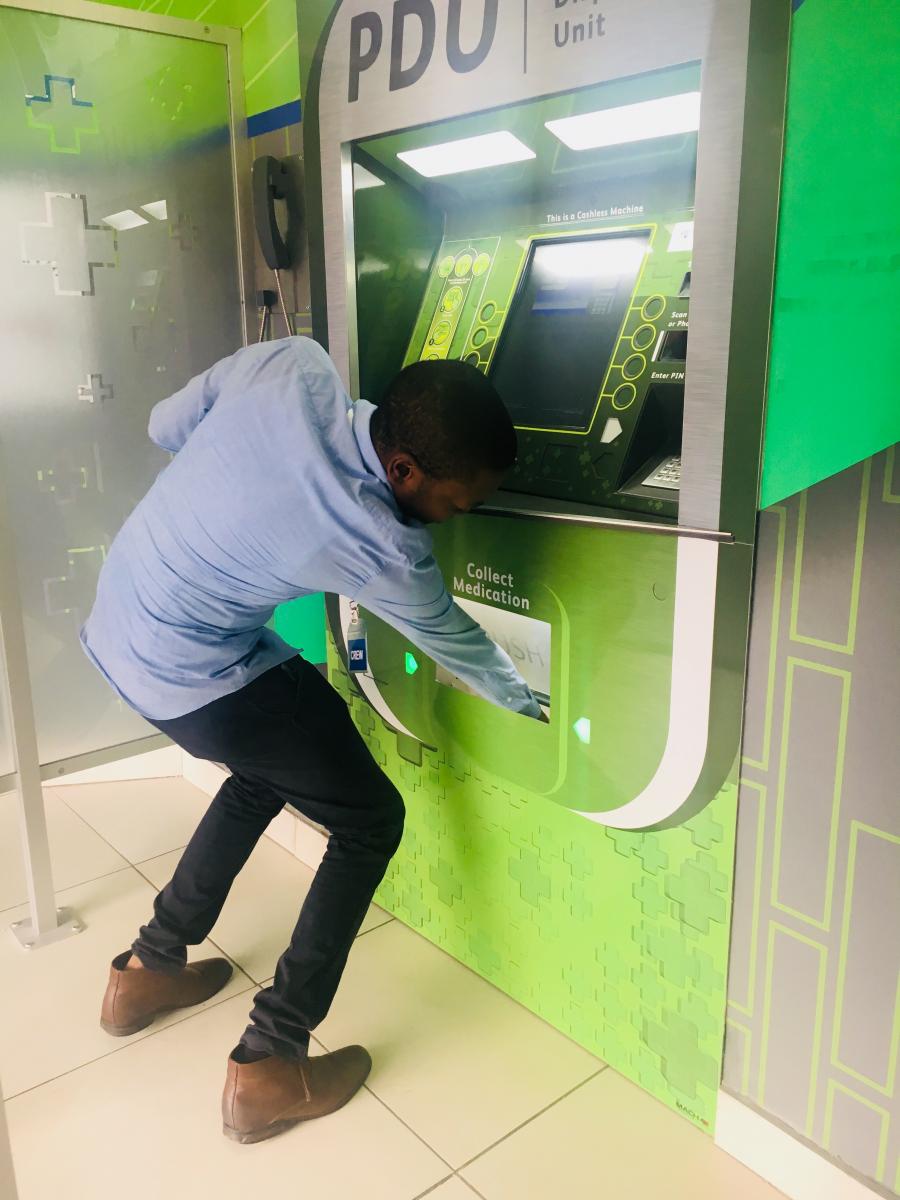
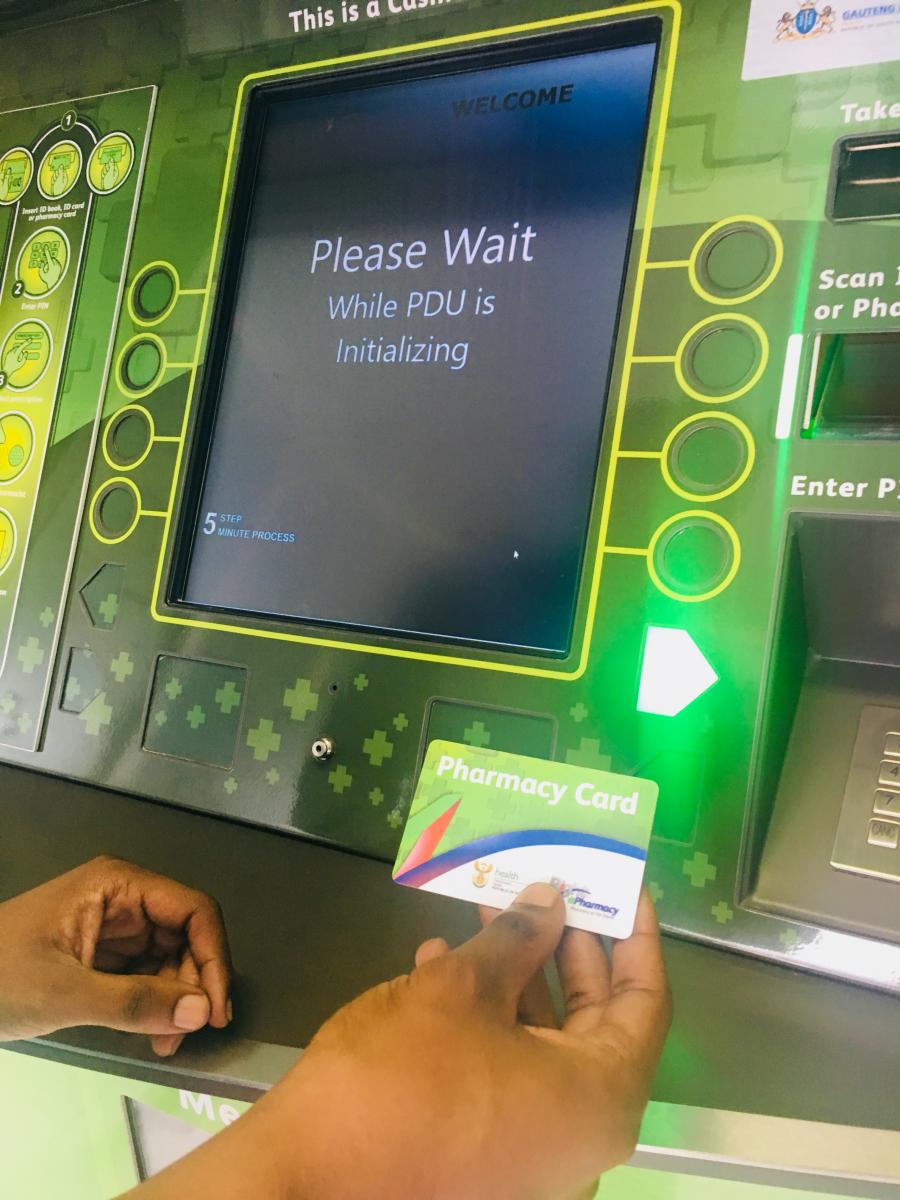 Speaking to Vuk’uzenzele, pharmacists assigned to the Alex PDU said that the system will help in delivering better services to patients who need medication for chronic illnesses.
Speaking to Vuk’uzenzele, pharmacists assigned to the Alex PDU said that the system will help in delivering better services to patients who need medication for chronic illnesses.
According to assistant pharmacist Nompumelelo Ramotshela, the system has been welcomed by health workers, especially pharmacists.
“We’re having very good feedback from the patients. We’ve seen that they’re happy because now they don’t have to take leave from work when they’re coming to the clinic.
“Most importantly, we can help a lot of patients, but this time around it’s faster,” said Ramotshela, who added that she can now go to work feeling proud and knowing that she won’t have to deal with angry patients frustrated about the long wait at public health care centres.
Meanwhile, Alexandra resident and patient Albie Modise said that he appreciates government’s efforts to bring about much-needed change.
“This ATM will definitely help a lot of us who are from this community.
“I used to go to the Alexandra clinic and the queues were always long; it was tiring and somewhat discouraging,” said Modise.
Agriculture Forestry and Fisheries: Call for nominations
Agriculture Forestry and Fisheries: Call for nominations Londekile2018 #YAFF Awards Competition
The Department of Agriculture, Forestry and Fisheries invites stakeholders in the sector to nominate young top producers either in agriculture, forestry or fisheries to enter for the 2018 #Youth in Agriculture Forestry and Fisheries Awards Competition.
Nominations are requested in the following categories:
- Agriculture Awards (Smallholder and commercial)
- Forestry Awards (Small-scale and Large-scale)
- Fisheries Awards (Small-scale and Large-scale)
- Agro-processing Awards (Small-scale and Large-scale)
- Special Awards: Agricultural Training Institutions graduate and Disabled Youth
Opening date for nominations: 01 February 2018
Closing date for nominations: 30 April 2018
Please note that late nominations will not be considered.
NB: Nomination forms are obtainable from the departmental website: www.daff.gov.za, under the DAFF Youth tab or use the following link http://www.daff.gov.za/daffweb3/AFF-Awards.
For enquiries please contact:
Mr Matlhatsi Seloane
Tel: 012 319 6228
E-mail: MatlhatsiS@daff.gov.za
Ms Olebogeng Gaelejwe
Tel: 012 319 6222
E-mail: OlebogengG@daff.gov.za
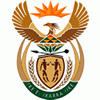
Anthem, flag, orders, coat of arms and symbols celebrate diversity
Anthem, flag, orders, coat of arms and symbols celebrate diversity Estelle GreeffMany freedoms South Africans enjoy were hard won and we celebrate them in April each year.
April is Freedom Month in South Africa.
 During this month a day has been set aside to celebrate the dawn of freedom and democracy and the achievements of all South Africans in moving away from hatred, divisions and a painful history to build a common future together.
During this month a day has been set aside to celebrate the dawn of freedom and democracy and the achievements of all South Africans in moving away from hatred, divisions and a painful history to build a common future together.Vuk’uzenzele takes a look at the significance of this day and what it means to us as South Africans.
On 27 April 1994 South Africa had its first non-racial democratic election. A new government was elected under the leadership of the late President Nelson Mandela. A great deal has been achieved over the years, but more still needs to be done to improve our country and change the lives of all South Africans.
April is not only for reflecting on how far we have come as a country, but is also a time when South Africa celebrates its heroes and heroines through the National Orders. These are the highest awards that a country, through its President, bestows on its citizens and eminent foreign nationals.
The Constitution of South Africa
The Constitution was drafted in terms of Chapter 5 of the interim Constitution (Act 200 of 1993) and was first adopted by the Constitutional Assembly on 8 May 1996. It was signed into law on 10 December 1996.
Our national symbols
South Africa is unique in the fact that we can celebrate our diversity through our national symbols and national flag, the anthem of South Africa and the coat of arms.
The South African Flag is unique. It was designed by former South African State Herald, Fred Brownell, and first used on 27 April 1994.
The colours of the flag have no specific meaning therefore no universal symbolism should be attached to the colours of the flag.
The ‘V’ in the flag symbolises the coming together of different elements of South Africa and taking the road ahead together in unity.
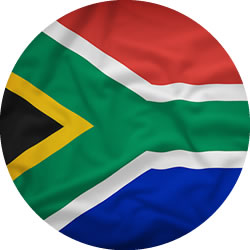 Flying the flag
Flying the flag
When the flag is displayed vertically against a wall, the red band should be to the left of the viewer with the hoist or the cord seam at the top. When it is displayed horizontally, the hoist should be to the left of the viewer and the red band at the top. When the flag is displayed next to or behind the speaker at a meeting, it must be placed to the speaker's right. When it is placed elsewhere in the meeting place, it should be to the right of the audience.
The National Coat of Arms
The national coat of arms, also known as the state emblem, is the highest visual symbol of the state.
The coat of arms is a central part of the great seal. A document with the imprint of the great seal has absolute authority because it means that it has been approved by the President of South Africa.
South Africa’s coat of arms was launched on Freedom Day in 2000. The elements on it are organised in such a way that it reflects stability and gravity.
The motto on the coat of arms, “!ke e: /xarra //ke” written in the Khoisan language, literally means diverse people unite.
The National Anthem
Our National Anthem is unique as it is sung in four languages.
The National Anthem was announced in 1997. It is a shortened, combined version of two anthems (‘Nkosi Sikelel’ iAfrika’ and ‘The Call of South Africa’/’Die Stem van Suid-Afrika’); sung between 1994 and 1997.
Our national symbols are as follows:
- National animal, the springbok
- National flower, king protea
- National tree, real yellowwood
- National bird, blue crane
- National fish, galjoen
Behind the scenes scramble for hero’s release
Behind the scenes scramble for hero’s release Estelle GreeffMandela Centenary
Mandela Reception Committee member reflects on an historic moment
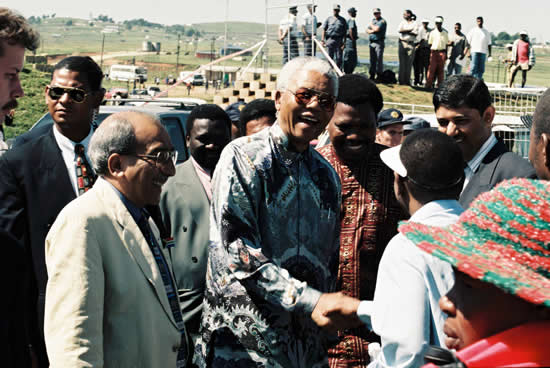 Nostalgia and euphoria are likely to always go hand in hand when the world remembers the day that one of the its finest icons, fist clenched, head held high, took his first steps as a free man.
Nostalgia and euphoria are likely to always go hand in hand when the world remembers the day that one of the its finest icons, fist clenched, head held high, took his first steps as a free man.
“I would change a lot of things, we would be better prepared now,” says one of the men who played a key role in events that unfolded that day 28 years ago.
Now chairman of the board of Vuwa Investments, Bulelani Ngcuka was one of the key individuals behind the historic events leading to the birth of a new South Africa.
Ngcuka, human rights lawyer Dullah Omar and former Chief Justice Pius Langa, who have since passed away, were part of the Nelson Mandela Reception Committee set up to receive Mandela after he was released from prison.
Government has dedicated 2018 to celebrating the life and times of South Africa’s first democratically elected President.
Ngcuka distinctly remembers how the then apartheid government impressed on the committee to make Mandela’s safety a key priority. This stern warning was dismissed with a simple “you needn’t tell us that” followed by a “he’s one of us.”
During the opening of Parliament then President FW de Klerk announced the unbanning of liberation movements such as the African National Congress and the release of Mandela.
Ngcuka remembers that the day before Mandela’s release, he cut short his speech to the Consultative Business Movement which was formed to engage white business people. He wanted to make his way to the Victor Verster prison in Paarl.
He rushed home for a change of clothes and to brief fellow committee members and anti-apartheid activists Trevor Manuel and Valli Moosa. The trio drove to human rights lawyer Dullah Omar’s home to plan their next move.
At a press briefing that day President de Klerk confirmed Madiba’s release.
That Saturday evening at Mandela’s cottage on the prison premises, the committee burnt the midnight oil, strategising events of the following day.
Ngcuka recalls how the committee arrived at the cottage to find Mandela dressed in his pyjamas and readying for bed. Mandela had been moved to the cottage on the prison premises, following his discharge from a clinic in Cape Town following a bout of tubercolosis.
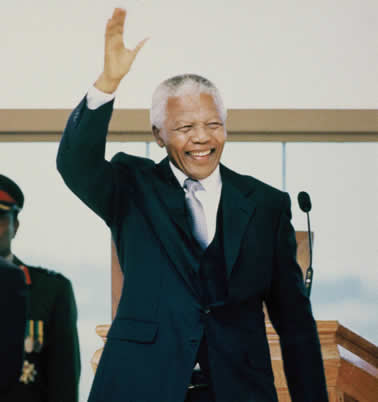 Grape juice in hand, committee members arranged a rally that would be held at the Grand Parade in the Cape Town city centre the next day following his release at 3pm. At that meeting Madiba offered pointers on what his speech, which Moosa was to arrange, should entail.
Grape juice in hand, committee members arranged a rally that would be held at the Grand Parade in the Cape Town city centre the next day following his release at 3pm. At that meeting Madiba offered pointers on what his speech, which Moosa was to arrange, should entail.
The man who spent 27 years of his life incarcerated had also insisted that he be released from the prison instead of transported to his house in Soweto as had been offered by President de Klerk. In addition, his beloved wife Winnie had to be by his side.
Essentials such as sound systems, posters and flyers and bussing in people from all over had to be organised that night when most places were closed for business.
The Archbishop was unable to fly to Cape Town because all flights were fully booked.
As fate would have it , in an earlier radio interview, Ngcuka had said that the people’s hero would spend the night at Bishopscourt. When the BBC hear about the Archbishop’s predicament, the British broadcaster offered him a seat on their plane to Cape Town.
Flight delays for committee chairperson Cyril Ramaphosa, who flew in from Port Elizabeth alongside Rivonia trialist “Oom Gov” Govan Mbeki, bought the committee some much-needed time to secure cars for the Madiba motorcade that would head to the rally on Sunday afternoon.
With all the delays sorted out, the delegation arrived at the prison an hour late that Sunday afternoon.
Throngs of people lined the streets from Paarl to the Grand Parade hoping to catch a glimpse of Madiba in the motorcade.
“We got through and we stopped and I moved from my car to Madiba’s car. He was cool as a cucumber. All he said was “my son you welcome me with a bang.”
In the chaos, Ngcuka took the decision to drive Madiba to a friend’s house in Rondebosch where they would discuss their next move. However, when they arrived the house was empty. Hot on their heels were Trevor Manuel and Archbishop Tutu who convinced them to drive back to the Parade.
“The Archbishop said if Mr Mandela does not address the people of South Africa tonight, Cape Town will be in ashes, you have to go back. We went back this time led by the police, “said Nqcuka.
The big moment for the then 71-year-old Madiba to address the crowd for the first time in almost three decades finally arrived and was almost scuppered by one technicality.
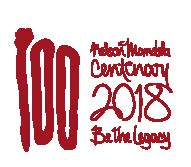 “He realised that he had forgotten his glasses at Victor Verster and so mam Winnie took off hers and gave them to Madiba. So that first picture you see of Madiba addressing the world, he does so wearing Winnie’s glasses,” said Ngcuka, who went on to become the first head of the National Directorate of Public Prosecutions appointed under President Mandela’s administration.
“He realised that he had forgotten his glasses at Victor Verster and so mam Winnie took off hers and gave them to Madiba. So that first picture you see of Madiba addressing the world, he does so wearing Winnie’s glasses,” said Ngcuka, who went on to become the first head of the National Directorate of Public Prosecutions appointed under President Mandela’s administration.
“Ngcuka has welcomed government's decision to mark the centenary of Madiba's birth.
"The centenary is not just a celebration of Madiba but also a celebration of the achievements of the people of South Africa,” he said.
And just what are the lessons that one can draw from Madiba’s release?
“For me that day gave me a glimpse of what a happy South Africa can be like when we are united in our diversity. For me that was the moment when we became free,” he said.
Mandela who passed away in December 2013 would have turned 100 on 18 July 2018.
Bridge over troubled traffic eases congestion
Bridge over troubled traffic eases congestion lebangThe completion of one of the longest structures ever built in South Africa means morning commuters between Umhlanga and the KwaZulu-Natal north coast no longer have to endure traffic congestion.
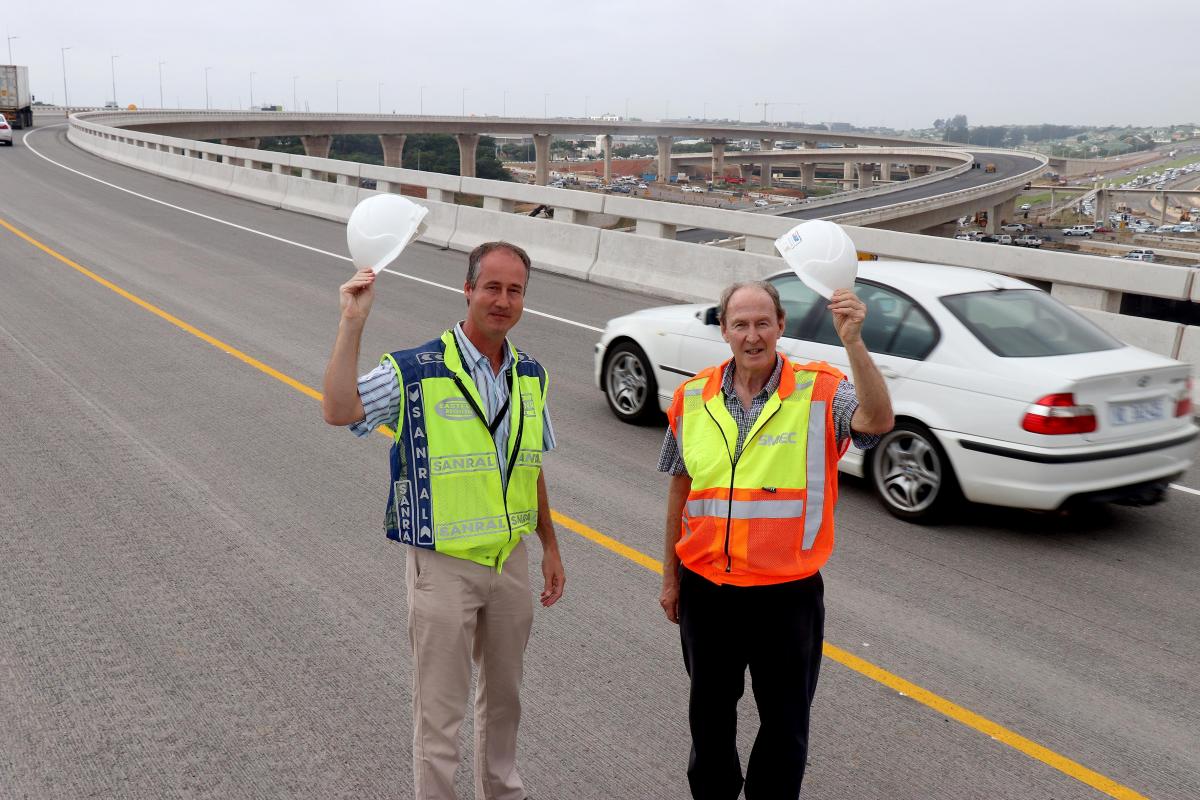 Jointly funded by the South African National Roads Agency SOC Ltd (Sanral) and KwaZulu-Natal (KZN) Department of Transport the construction was the task of the South African branch of Italian construction company CMC di Ravenna.
Jointly funded by the South African National Roads Agency SOC Ltd (Sanral) and KwaZulu-Natal (KZN) Department of Transport the construction was the task of the South African branch of Italian construction company CMC di Ravenna.
The kilometre-long bridge - one of the longest structures ever built in South Africa - is part of the improvements Sanral is making at the N2 (M41) Mt Edgecombe Interchange to the north of Durban. The bridge connects Phoenix and Umhlanga with Durban and the North Coast of KZN.
The Mt Edgecombe Interchange upgrade has changed the landscape forever. The new four-level interchange facility provides at least two lanes on each of the major movements. The upgrade includes the implementation of directional ramps, eliminating the need for controlled signalling, thus ensuring the free flow of traffic in all directions.
Sanral Eastern Region project manager Corné Roux said the iconic Mt Edgecombe Interchange is a vital artery of the greater eThekwini metropolitan highway system for easing traffic and is also a significant business enabler.
“An additional 40 000 vehicles enter or leave the N2 from the M41 daily, which resulted in substantial queuing of vehicles during the day. This, together with expected future expansions and anticipated development of the Cornubia area, required the existing interchange to be upgraded,” said Roux.
Waterloo resident Sicelo Mkhize said before the completion of the interchange they were always late for work.
“Now it takes me about 20 minutes to get to Durban. We are thankful to Sanral for making our lives easier,” he said.
To provide for the safety of pedestrians, a bridge has been constructed over the N2. It will connect to new footways. In addition, lighting will be installed to ensure the whole interchange is lit at night for increased safety.
“Only one lane of the new ramp from Phoenix and Mt Edgecombe will be open to traffic to allow for completion of the construction of a new ramp from the N2 northbound taking traffic towards the Gateway shopping complex. The second lane of the new ramp will be open by mid-April. Motorists are urged to proceed with caution and adhere to speed limits,” Roux said.
Building a bond beyond bars
Building a bond beyond bars lebangMother and child units allow the bonding that is critical during an infant's first years to take place in an environment that is as nurturing as possible.
Minenhle* is just seven weeks old and she has already had a taste of what life is like in a correctional facility.
Her mother Phumelele Madela, (36), is serving an eight-year sentence for fraud involving money laundering. Madela is being rehabilitated at the Johannesburg Correctional Centre’s Mother and Child Unit.
Minenhle will stay with her mom for 24 months to allow a strong bond to develop, before being sent to live with a family member while Madela completes her sentence.
While inside mothers leave their children with childminders while they attend courses offered by the Department of Correctional Services. These include parenting, anger management and economic crime awareness courses.
Madela grew up in Soweto with her mother and brother.
“I got sucked into the world of crime because I was living beyond my means. I was a bread winner with two other children. I was employed by a logistics company doing administration and was in debt; life was tough,”she said.
Madela was part of the money laundering syndicate for about a year and was caught when her company started an investigation.
She said speaking out about her mistakes is her way of saying sorry to her victims and a form of rehabilitation.
“When I arrived at this facility I was four months’ pregnant and had been given a 13-year sentence, suspended for five years,” she said.
“I gave birth at Chris Hani Baragwanth Hospital.
When I needed to go for my check-ups I would be shackled. I had to endure the stares as part of paying my dues to society.”
Madela said that it took time to come to terms with life in a correctional facility especially because part of her sentence is served with her daughter.
“I would cry and I was angry but with the counselling and courses that we attend in this facility it became easier for me to accept what had happened.”
The remorseful Madela said she is very sorry for the crime that she committed and the hurt that she caused.
“To young people out there who are thinking of committing crime, think before you act; there are always two roads in life – one good, and another bad that could land you in here. I chose the bad road.”
Accommodating mothers and babies
Ofentse Morwane, communications manager for Gauteng Correctional Services said that the Johannesburg unit, which currently houses 27 babies and their mothers, was officially opened in 2012. Similar facilities exist at other centres, including:
- East London Correctional Centre in the Eastern Cape.
- Durban Westville Correctional Centre in KwaZulu-Natal.
- Polokwane Correctional Centre for the Limpopo, North West and Mpumalanga region.
- Kroonstad Correctional Centre for the Free State and Northern Cape region.
Morwane said the roll-out of these mother and child units is the department’s direct response to the increasing number of babies who find themselves behind bars with their mothers.
“These facilities have been designed with the interests of the child in mind to allow the babies to have as normal an existence as possible, given the incarceration of their mothers.”
*Not her real name
Business at pizza outlet is cooking
Business at pizza outlet is cooking LondekileAn ambitious entrepreneur’s business in Thaba Nchu is producing good food fast.
Keorapetse Sebusi started operating Quintos Pizza six months before he officially registered the outlet because he first wanted to test the market.
“We tested out the market for six months, because we wanted to make sure it’s something that we wanted to do and to check whether it would be profitable,” said Sebusi.
Working from a renovated house garage, the business has grown into a reliable fast food outlet competing with big pizza brands.
Funding received from the National Youth Development Agency (NYDA) gave Sebusi’s business a boost.
The NYDA assisted with equipment including a dough mixer, an under-counter fridge and a conventional restaurant oven.
“I’m very grateful for the support and assistance from the NYDA as the funding they gave us was a huge stepping stone in the growth of the business. Our customers are also happy that we are able to deliver on time,” said Sebusi.
With an ever-growing clientele Quintos Pizza employs six permanent employees.
“We plan to expand the business’s operations to a much bigger and better equipped space,” Sebusi explained.
He has dreams to grow the business.
“I’d like to see Quintos Pizza as a stable brand and registered as a franchise, but first I want to see it as a fully established food outlet in Thaba Nchu.”
Although Quintos Pizza is now a success, Sebusi explained that it wasn’t easy to grow the business.
“It’s been almost two years now trying to get this dream of Quintos Pizza alive and it hasn’t been easy, but having patience, perseverance, knowing that in the process there are ups and downs and discipline has pulled us through,” added the motivated entrepreneur.
Although Quintos Pizza, sells pizza primarily, it also offers butter chicken and naan, tacos and shawarma “to offer our customers
variety”.
Fighting corruption is everyone’s business
Fighting corruption is everyone’s business LondekileCorruption has no place in South Africa and government is calling on all citizens to act decisively to end dishonest and fraudulent conduct.
Corruption has taken centre stage in South Africa over the last few months in the wake of allegations of state capture and corruption scandals from private sector.
The allegations created a negative outlook for the country, especially with investors.
In his State of the Nation Address President Ramaphosa said “we must fight corruption, fraud and collusion in the private sector with the same purpose and intensity”.
“We must remember that every time someone receives a bribe there is someone who is prepared to pay it. We will make sure that we deal with both in an effective manner.”
However government cannot fight corruption alone and is committed to rooting out corruption in all forms in the private and public sector while calling on all citizens to play their part.
Corruption is the abuse of public resources or public power for personal gain.
While the police and other arms of government are at the forefront in the fight against corruption, ordinary South Africans have their own role to play.
Several ongoing investigations and a number of arrests show that government wants to fight this scourge in South Africa.
The latest came in mid-March, when nine officials from the departments of Home Affairs and Correctional Services were arrested for their part in the illegal release of at least 36 parolees.
The followed a high-level, multi-disciplinary investigation by anti-corruption investigation teams from the departments of Home Affairs and the Correctional Services, led by the South African Police Service’s Crime Intelligence Division.
Following the arrests, Police Minister Bheki Cele said: “This is a clear indication of the seriousness of government in clamping down on corruption within our own ranks.”
Minister Cele said the officials were allegedly involved in illegally releasing at least 36 parolees, all of which were women, over a period of more than a year without following proper procedures. This was done for financial gain apparently with bribes ranging from between R3 000 and R6 000 being paid into the officials’ bank accounts or handed over in cash, by friends or family members of the parolees.
The parolees were from Guyana in South America, Congo, Nigeria, Ghana, Zambia, Zimbabwe, Mozambique and Lesotho.
“The foreign parolees, most of whom were drug smugglers or drug mules, had to be released and deported to their country of origin through the Lindela deportation centre. Instead, they were sent directly to the Johannesburg Department of Home Affairs’ regional office for an unprocedural and illegal early release,” said Minister Cele.
As a citizen you can help rid the country of corruption by not becoming involved in corrupt activities and reporting any corruption you suspect or are aware of.
How you can help fight corruption
A number of hotlines and helplines have been created by government to ensure that you can pass on information without having to reveal your identity.
Corruption is a crime and can be reported to the police. You can pass on any information you may have without having to give your name or personal details. If the information helps in the positive investigation of a criminal case, you may be entitled to a reward. Call the Crime Stop number 08600 10 111.
Anonymous tip-offs on criminal activities can also be sent to Crime Line. You can send an SMS containing information to 32211 at a cost of R1 per SMS.
In addition to the above numbers, you can also call government’s National Anti-Corruption Hotline and pass on information on corrupt activities you are aware of without giving your name. The number is 0800 701 701.
What are you doing to fight against corruption in your community or your place of work?
Share your commentswith us on: email: vukuzenzele@gcis.gov.za or on our Facebook and Twitter pages.
Twitter: @Vuk’uzenzele
Facebook: Vu’uzenzele
Ideal clinic upholds national standards
Ideal clinic upholds national standards Estelle GreeffBertha Gxowa Primary Health Care (PHC) clinic in Gauteng leads in terms of aligning its services with the National Core Standards (NCS).
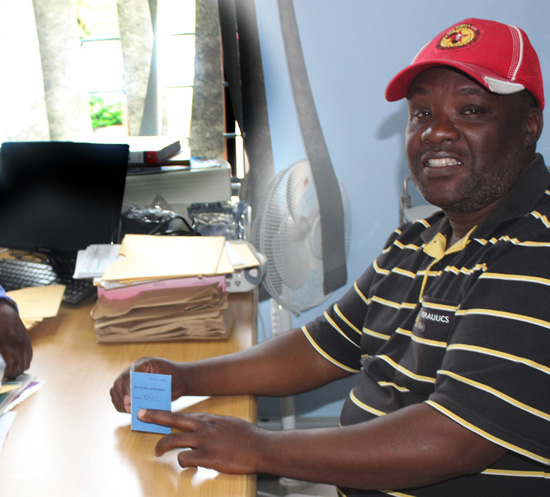 Ahead of the introduction of National Health Insurance (NHI), the quality of South Africa’s health care services is assessed according to the uniform set of expectations set out in the NCS.
Ahead of the introduction of National Health Insurance (NHI), the quality of South Africa’s health care services is assessed according to the uniform set of expectations set out in the NCS.
Meeting these NCS makes the Bertha Gxowa PHC facility exemplary and, it would seem, a pleasure to visit.
Minute Mofokeng visits the clinic for a monthly check-up and to collect his diabetes medication. He said he waits no more than 20 minutes to be seen. “The nurses are caring and friendly, they listen to my concerns and my medication is always available for me.
“I am also very proud to hear that my community clinic is the best in the country. It warms my heart that we have a caring government,” said Mofokeng.
Bertha Gxowa PHC clinic has equipped emergency and resuscitation rooms; reduces congestion and waiting times by using a booking system for patients with chronic diseases; and provides a Central Chronic Medicine Dispensing and Distribution pickup point for medicines.
Gauteng tops the chart with ideal clinics
The Department of Health’s latest ideal clinic status reports that Gauteng has had the highest number of ideal clinics (281 out of 372) across the country from 2015 to 2018.
The Ekurhuleni district has the highest percentage of facilities with ideal status at 88.2 percent.
Tshwane district scored 86.3 percent, Sedibeng 74.4 percent, Johannesburg 72.6 percent and West Rand 45.8 percent.
An ideal facility has good infrastructure, adequate staff and medical supplies, good administrative processes, and implements applicable clinical policies, protocols and guidelines. A clinic should cooperate with other government departments and private sector and non-governmental organisations to address the social determinants of health.
Sister Virginia Nkomo who is the operational manager of the Bertha Gxowa PHC clinic said constant team work and communicating properly are among the reasons why it is a top facility.
“We try our best to ensure that patients don’t wait for a long time and we inform them if we are experiencing any difficulty. We also have a suggestion box where patients have an opportunity to share their view with us.”
Inaugural 10km run lures youngsters
Inaugural 10km run lures youngsters LondekileSport is a way to make friends, have fun, get fit and stay out of trouble and it seems the organisers of the first ever uMtshezi/Wembezi 10km run were surprised by the youth's enthusiasm.
The future is bright for young athletes from Harry Gwala District Municipality in KwaZulu-Natal (KZN). The youngsters recently showed off their skills at the inaugural uMtshezi/Wembezi 10km challenge. The race drew a strong field of top class athletes in both the men’s and women’s categories.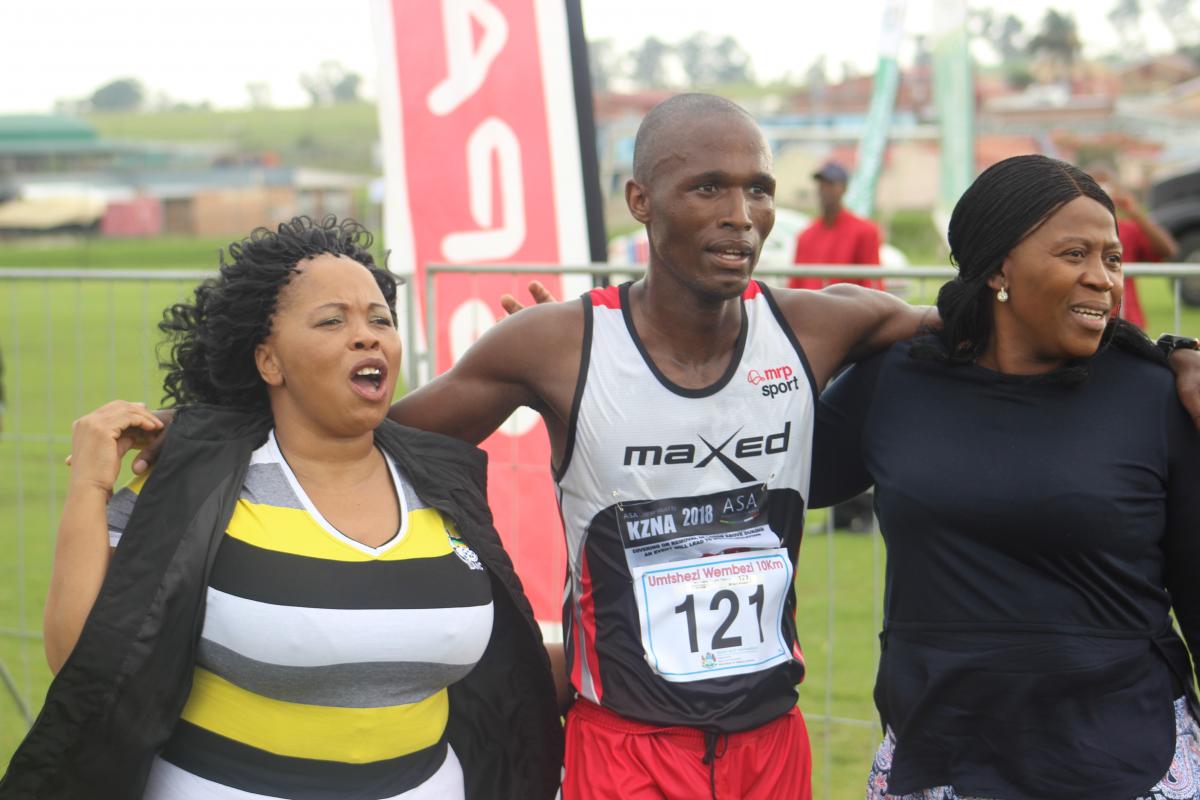
Thobani Chagwe won the men’s race while Janet Mbhele was the first woman home. They walked away with R10 000 in prize money each.
The KZN Department of Sport and Recreation, uMtshezi Athletics Club and Inkosi Langalibalele Local Municipality organised the race which had a 10km event and a 5km fun run.
Department of Sport and Recreation MEC Bongi Sithole-Moloi said the challenge is in line with the department’s effort to give especially young people in rural areas opportunities to participate in sport.
“With this sporting event, the department aims to promote participation in sport, a healthy lifestyle as well as social cohesion. Due to the immense turn out and participation, the organisers committed to expand next year‘s race to accommodate young children as they showed great enthusiasm and willingness to be part of the event. The race will be an annual event and will be named after Premier Mchunu who hails from the Estcourt area. Other distance categories will be added in the coming year,” she said.
Chagwe, who set the Mandela Marathon record in 2014, encouraged the youth to participate in sport as it will keep them away from the streets and substance abuse.
“Young people should stay away from substance abuse because once you get involved and addicted it is very difficult to come out of it. If you are bored and do not know what to do just go out and exercise. This not only helps your body stay fit but it keeps you focused as well and kicks away illnesses,” he said.
Jobs: Justice and Constitutional Development: Apr 2018
Jobs: Justice and Constitutional Development: Apr 2018 LondekileRegional Heads: (3 Posts)
Gauteng
Reference: 18/45/GP/CS
Eastern Cape
Reference: 18/46/EC/CS
Kwazulu-Natal
Reference: 18/47/KZN/CS
Package: R1 127 334- R1 347 879 per annum (All inclusive). The successful candidate will be required to sign a performance agreement.
Requirements: An undergraduate qualification (NQF level 7) as recognised by SAQA/ LLB; At least 5 years' experience at senior managerial level; Relevant work experience in the field of public administration, understanding of Constitutional matters and International law will be an added advantage; knowledge of criminal, civil and family cases; Knowledge of service delivery, improvement models and human resource practices; Knowledge of Legal and Administration Processes; Knowledge of the Public Finance Management Act, 1999, prescripts and Regulations; A valid driver's licence.
Enquiries:
Ms M Kganyago
Tel: 012 3151844
Director: Court Operations (4 Posts)
Gauteng
Reference: 18/41/GP/CS
Northern Cape
Reference: 18/42/NC/CS
Western Cape
Reference: 18/43/WC/CS
East London
Reference: 18/44/EC/CS
Package: R948 174 - R1 116 918 per annum (All inclusive). The successful candidate will be required to sign a performance agreement.
Requirements: An undergraduate qualification (NQF level 7) in Administration as recognized by SAQA, At least 6 years' experience of which 5 years must be at middle/senior managerial level; Knowledge of legislation, prescripts and Frameworks of the Public Service; Experience in Court Management will be an added advantage; Experience in Infrastructure and Property will be an added advantage; A valid driver's licence.
Enquiries:
Gauteng:
Mr ST Ledwaba
Tel: 011 332 9015
Northern Cape
Ms C Adams
Tel: 053 802 1343
Western Cape
Ms R Hendricks
Tel: 021 462 5471
Eastern Cape
Mr M Mthombeni
Tel: 043 721 2783
Director: Human Resource (3 Posts)
Reference: 18/35/WC/HR
Reference: 18/36/GP/HR
Reference: 18/37/EC/HR
Package: R948 174 - R1 116 918 per annum (All inclusive). The successful candidate will be required to sign a performance agreement.
Requirements: A undergraduate qualification (NQF Level 7). At least six (6) years Human Resource experience of which five (5) years must be at middle/senior management level; Knowledge of legislation prescripts and frameworks of the department; A valid driver's license;
Enquiries:
Ms M Kganyago
Tel: 012 315 1844
Director: Finance (3 POSTS)
Reference: 18/38/NC/CS
Reference: 18/39/FS/CS
Reference: 18/40/WC/CS
Package: R 948 174- R 1 116 918 per annum (All inclusive). The successful candidate will be required to sign a performance agreement.
Requirements: An undergraduate qualification (NQF level 7) in Finance/B.Com in Public Finance or Auditing as recognized by SAQA; Five (5) years at middle/senior manageriallevel; Experience in revenue & debt management and financial reporting; Knowledge of Public Financial Management Act (PFMA), Treasury Regulations, Generally Accepted Accounting Practice other (GAAP) and Public Services Regulations; A valid driver's licence.
Enquiries:
Free State
Ms M Mofubelu
Tel: 051 407 1806
Northern Cape
Ms CAdams
Tel: 053 8021343
Western Cape
Ms R Hendricks
Tel: 021 462 5471
Closing date: 03 April 2018
Note: Interested applicants may visit the following website: www.justice.gov.za or www.dpsa.gov.za to view the full job specification of the above positions. Applications must be submitted on Form Z83, obtainable from any Public Service Department or on the internet at www.gov.za. A Z83 form & CV must be accompanied by original certified copies of qualifications, identity document and a driver's licence where necessary. A SAQA evaluation report must accompany foreign qualifications. Applications that do not comply with the above mentioned requirements will not be considered. All shortlisted candidates for SMS posts will be subjected to a technical and competency assessment. Candidate will complete a financial disclosure form and also be required to undergo a security clearance. The foreigners or dual citizenship holder must provide the Police Clearance certificate from country of origin.
The DOJ&CD is an equal opportunity employer. In the filling of vacant posts the objectives of section 195 (1) (i) of the Constitution of South Africa, 1996 (Act No: 108 of 1996), the Employment Equity imperatives as defined by the Employment Equity Act, 1998 (Act No: 55 of 1998) and relevant Human Resources policies of the Department will be taken into consideration. Reasonable accommodation shall be applied for People with Disabilities including where drivers licence is a requirement. Correspondence will be limited to short-listed candidates only. If you do not hear from us within 3 months of this advertisement, please accept that your application has been unsuccessful. The department reserves the right not to fill these positions. Women and people with disabilitiesare encouraged to apply and preference will be given to the EE Target.

Jobs: Labour Apr 2018
Jobs: Labour Apr 2018 LondekileAssistant Director: COIDA
Labour Centre: Rustenburg
Ref No: HR 4/4/9/315
Salary: Commencing: R 334 545.00 per annum
Provincial office
Chief Director Provincial Operations:
Private Bag X 2040
Mmabatho, 2735 or deliver at Departmentof Labour, University Drive, Provident House, Office 212, 2nd Floor.
Assistant Director: Inspection Services
Provincial Office: KwaZulu-Natal
Ref No: HR 4/4/5/18
Salary: Commencing: R 417 552 per annum
Enquiries: Mr MP Tshabalala
Tel: 033 341 5300
Provincial office
Chief Director: Provincial Operations
PO Box 940, Durban, 4000
Deputy Director Labour Centre Operations
Labour Centre: Lichtenburg
Ref No: HR 4/4/9/299
Salary: All inclusive: R 779 295.00 per annum
Enquiries: Mr OPS Sebapatso
Tel (018) 387 8100
Provincial office
Chief Director: Provincial Operations:
Private Bag X 2040, Mmabatho, 2735
Deputy Director Public Employment Services
Provincial Office: Mmabatho
Ref No: HR 4/4/9/309
Salary: All inclusive: R 779 295.00
Enquiries: Mr OPS Sebapatso
Tel: 018 387 8100
Provincial office
Chief Director: Provincial Operations:
Private Bag X 2040, Mmabatho, 2735
Closing date for applications: 17 April 2018
For full details of the advertised posts visit ourwebsite: www.labour.gov.za
Applications must be submitted on form Z83, obtainable from any Public Service Department or on the internet at www.gov.za/documents. The fully completed and signed form Z83 should be accompanied by a recently updated, comprehensive CV as well as recently certified copies of all qualification(s) including a Senior Certificate and ID-document [Driver’s license where applicable]. Non-RSA Citizens/Permanent Resident Permit Holders must attach a copy of their Permanent Residence Permits to their applications. Should you be in possession of a foreign qualification, it must be accompanied by an evaluation certificate from the South African Qualification Authority (SAQA). Applicants who do not comply with the above-mentioned requirements, as well as applications received late, will not be considered. The Department does not accept applications via fax or email. Failure to submit all the requested documents will result in the application not being considered. Correspondence will be limited to short-listed candidates only. If you have not been contacted within eight (8) weeks after the closing date of this advertisement, please accept that your application was unsuccessful. Suitable candidates will be subjected to a personnel suitability check (criminal record, citizenship, credit record checks, qualification verification and employment verification). Where applicable, candidates will be subjected to a skills/knowledge test. All shortlisted candidates for SMS posts will be subjected to a technical competency exercise that intends to test relevant technical elements of the job, the logistics of which be communicated by the Department. Following the interview and technical exercise, the selection panel will recommend candidates to attend generic managerial competencies using the mandated DPSA SMS competency assessment tools. Successful candidates will be appointed on a probation period of 12 months. The Department reserves the right not to make any appointment(s) to the above post. The successful candidate will be expected to sign a performance agreement. The Department of Labour is an equal opportunity affirmative action employer. The employment decision shall be informed by the Employment Equity Plan of the Department. It is the Department’s intention to promote equity (race, gender and disability) through the filling of this post(s) with a candidate whose transfer / promotion / appointment will promote representativity in line with the numerical targets as contained in our Employment Equity Plan.

Jobs: Social Development Apr 2018
Jobs: Social Development Apr 2018 Londekile
Director: Women Empowerment and Gender Focal Point
(Ref No.:R1/A/2018)
Chief Directorate: Gender
Total cost-to employer package: R948,174.00 per annum.
This inclusive remuneration package consists of a basic salary, the states’ contribution to the Government Employees Pension Fund and a flexible portion that may be structured i.t.o. the applicable rules.
Centre: Pretoria, HSRC Building
Requirements: An appropriate recognised Bachelor’s Degree in Social Science or equivalent qualification (NQF level 7) as recognised by SAQA PLUS five years middle/senior management experience in the gender field. Knowledge of Public Service Regulations. Expertise on gender issues. Knowledge of Legislation, policies on Gender and transformation. Knowledge on Women empowerment. Knowledge of the PFMA. Knowledge of the supply chain processes.
Competencies needed: Project management skills. Internal and external networking skills. Policy development and analytical skills. Financial management skills. Interpersonal skills. Communication (written, verbal and liaison) skills. People management and empowerment skills. Client orientation and customer focus skills. Negotiation skills. Strategic planning skills. Presentation skills. Problem solving skills.
Attributes: Emotional Intelligence. Creative. Honesty and Integrity. Innovative. Computer literacy. Ability to work under pressure. Assertiveness.
Key responsibilities: Manage and monitor the development of policies, legislation, minimum norms and standards, practice in respect of gender issues. Manage capacity development for women empowerment and gender equality matters. Advocate for gender issues to be considered in the departmental planning processes. Adopt a wide set of options for governance and institutional development. Adopt a wide set of options for women empowerment and gender equality. Manage the advocacy and lobbying on gender issues. Provide support to various Directorates for compliance with international and national reporting obligations. Manage the compilation of regular reports for various gender stakeholders and organs of Government.
Note: In terms of the Chief Directorate’s employment equity targets, African males and persons with disabilities are encouraged to apply.
Enquiries:
Ms D Moema
Tel: 012 312 7394
Applications: The Director General, Department of Social Development, Private Bag X901, Pretoria, 0001, Physical Address: HSRC Building, 134 Pretorius Street
For attention:
Ms E Steenkamp
Closing date: 13 April 2018
Note: Curriculum vitae with a detailed description of duties, the names of two referees and certified copies of qualifications and identity document must accompany your signed application for employment (Z83). In the event of hand delivery of applications, applicants must sign an application register book as proof of submission. All shortlisted candidates for SMS posts will be subjected to a technical exercise that intends to test relevant technical elements of the job, the logistics of which will be communicated by the Department. Following the interview and technical exercise, the selection panel will recommend candidates to attend a generic managerial competency assessment (in compliance with the DPSA Directive on the implementation of competency based assessments). The competency assessment will be testing generic managerial competencies using the mandated DPSA SMS competency assessment tools. The successful candidate will sign an annual performance agreement, complete a financial discloser form and will also be required to undergo a security clearance. If the candidate is applying for an OSD post, certificates of service must be attached to the CV. It is the applicant’s responsibility to have foreign qualifications evaluated by the South African Qualification Authority (SAQA). Failure to submit the requested documents will result in your application not being considered. Personnel suitability checks will be conducted on short listed candidates and the appointment is subject to positive outcomes of the checks. Correspondence will be limited to shortlisted candidates only. The selection of candidates will be done with due regard to the relevant aspects of the selection process as set out in the Public Service Regulations, 2016 Chapter 4/67. Applications received after the closing date will not be taken into consideration. No faxed or e-mailed applications will be considered.If you have not been contacted within three months after the closing date of this advertisement, please accept that your application was unsuccessful.
It is our intention to promote representivity (race, gender and disability) in the Public Service through the filling of these posts and candidates whose transfer / promotion/ appointment will promote representivity will receive preference.

Labour: Tender Apr 2018
Labour: Tender Apr 2018 LondekileAppointment of a service provider to design, maintain a mobile office and clinic solution on a three year lease basis for Compensation Fund (CF).
The Compensation Fund (CF) wishes to invite all potential respondents to submit their proposals.
Bid Number: TCF 11: 2017/2018.
Bid Description: Appointment of a Service Provider to design, maintain a mobile office and clinic solution on a three year lease basis for Compensation Fund (CF).
Closing Date: 26 April 2018 at 11h00am.
Briefing session details.
There is Compulsory Briefing session for this bid.
Meeting Date: 10 April 2018 at 10h00am.
Meeting Place: The Compensation Fund (CF), Benstra Building, Boardroom 424, 473 Stanza Bopape street, Arcadia, Pretoria, 0083
The Tender Documents are obtainable from: The Compensation Fund (CF), Reception (Security Area) and also on the Departmental Website www.labour.gov.za, under Tenders
Enquiries: SCM.enquiries@labour.gov.za
NB: All Documents should be clearly marked: tender number, description, closing date and time and deposited in the tender box situated at the Reception Area, Compensation Fund (CF),
473 Stanza Bopape Street, Benstra Building, Pretoria, Arcadia,0083

Life Esidimeni victims' families awarded R1.2m
Life Esidimeni victims' families awarded R1.2m LondekileGovernment has been ordered to pay victims of the Gauteng mental health care tragedy a total of R1.2 million each by no later than 19 June 2018.
Life Esidimeni arbitrator and retired Deputy Chief Justice Dikgang Moseneke made the order as he read out a condensed version of his 100 page judgment on March 19.
Justice Moseneke said the marathon project was inhumane and stripped victims of their dignity.
“Every element of the marathon project trampled on the dignity of the mental health care users in every way. The users were stripped of their dignity in life and death,” said the arbitrator.
A total of R1 million is to be paid to the victims for constitutional damages for the violation of their human rights.
In addition, R200 000 is to be paid by government, R20 000 for funeral expenses and
R180 000 for the shock and trauma endured by the families.
Justice Moseneke also ordered that a remembrance monument be erected at a public place to remind future generations of the importance of the case and of the plight of mental healthcare users.
He donated his arbitration fees to designated law schools and said he did so to allow future lawyers to carry out the work of standing up for those who can not defend themselves.
The award comes after the arbitration hearing saw families, senior government officials from the health department, members of the executive council of the province and non-profit organisations give testimony into the marathon project.
In a shocking move, in 2016 the former Health MEC Qedani Mahlangu, who was fingered as the leader of the project, ordered that mental healthcare users who were based at the Life Esidimeni healthcare facility be moved to cut costs.
The contract between the mental health care facility, Life Esidimeni and the Health Department, had been in place for over 30 years.
It was brought to a halt under the direction of the former MEC who instructed former Head of Department Barney Selebano, Head of Mental Health, Makgabo Manamela and Chief Director of Planning Levy Mosenogi, to scrap the contract.
Termination of the contract resulted in the deaths of over 140 patients from septicaemia, hypothermia and, in some instances, starvations.
The arbitrator however wholly rejected Mahlangu’s reasons for the move based on the contradictory testimony by Finance MEC Barabara Creecy who said the Health Department was given the lion’s share of the provincial budget year on year.
“Ms Mahlangu’s reasons for the move of the patients were irrational, unlawful and unconstitutional. The move was a serious breach in healthcare user protocol,” said Justice Moseneke.
This saw a mass move and transfer of patients who were ferried to unlicensed and ill-equipped NGOs.
“Patients were transported in bakkies, some with their limbs tied, this was cruel, inhumane and deeply degrading. The mental healthcare users were moved without proper identification and medical records and were set up for death,” said Justice Moseneke.
Harrowing accounts of the lack of care at the NGOs were given by Justice Moseneke who painted a grim picture of the state of affairs of these facilities.
“One of the first patients to die was Ms Deborah Phetla. Her post-mortem revealed that she had brown paper and plastic bags in her stomach which she ate,” he said.
Justice Moseneke said his office supplied the South African Police Service with a full record of the proceedings but denied the request that he order the SAPS to investigate. He said they should do their job as mandated by the Constitution.
Sadly, 44 patients who were part of the marathon project are still unaccounted for and remain as missing persons.
Mini dictionary hopes to make big difference
Mini dictionary hopes to make big difference LondekileIf a student does not understand a question asked in English they are at a disadvantage. Having a dictionary available that explains and teaches the verbs used in exams is empowering.
A lexicographer from the deeply rural community of Maphophoma in Nongoma, KwaZulu-Natal (KZN) has made history by producing a mini A-Z isiZulu dictionary.
Nhlanzeko Ngwenya (38) hopes the dictionary will help learners at rural schools better understand exam questions asked in English.
Ngwenya’s mini dictionary unpacks verb use in school assessments such as define, discuss and explain in isiZulu. He said many learners in rural areas fail their assessments, not because they do not know the answers, but because in their answers they define instead of discuss.
He said that in his experience as a teacher he had noticed that many learners struggled to understand these verbs as they are not explained correctly in most IsiZulu dictionaries.
“This mini dictionary is beneficial for daily activities, homework and in preparation for end-of-year assessments. The foreign national educators can also find it useful in dealing with South African learners in a classroom scenario,” he said.
Ngwenya said one of the striking features of the mini-dictionary A-Z lexicon is that the explanations are written in full sentences, using vocabulary and grammar that occur naturally with the particular verb being explained.
“This enables us to give a lot of information about the way a verb or meaning is used by speakers of the language,” he said.
Ngwenya's big wish is to get funding to publish the dictionary so it can reach more learners.
“Once it is published in a booklet format it will be easier for me to distribute it to learners. I am appealing to[the] government sector or business people to help me publish this dictionary. My advisor for the language pedagogy said the dictionary is ready for print now but lack of funding makes it difficult for me to take it to the printers,” he said.
One of the teachers at Nongoma Primary, Hendrick Fourie said he was very impressed when he saw Ngwenya’s dictionary.
“Words are explained nicely; once it is published I will make sure that learners in my school get copies too,” said Fourie.
Play your part in Mandela Fridays
Play your part in Mandela Fridays LondekileBe the legacy during Madiba's centenary year.
2018 has been declared the year to celebrate the life of Madiba.
South Africans and the international community have been called to emulate the values of the first democratically elected president of the country, Nelson Mandala, as we celebrate his centenary.
A key contributor to the centenary euphoria is Mandela Fridays where the domestic and international community are encouraged to perform acts of selflessness, giving back to those less fortunate and making the lives of others better.
“We call on all South Africans, schools, faith based organisations and other sectors of society to join in the centenary celebrations. Let us all, even in our busy lifestyles set aside some time to play our part and make a difference in the lives of others,” said Minister of Communications Nomvula Mokonyane.
President Cyril Ramaphosa declared 2018 the year of Nelson Rolihlahla Mandela in his State of the Nation Address. This is also the year that the international icon would have turned 100.
A year-long series of awareness, educational, celebratory and commemorative activities will take place across the country, building up to a national centenary celebration on former President Mandela’s birthday on July 2018.
The main event will take place at Mvezo, Eastern Cape, and will be led by President Ramaphosa.
More details on the planned centenary events in honour of formerPreside nt Nelson Mandela and Albertina Sisulu will be made available on www.gov.za
Members of the public are urged to post pictures, videos and selfies of what they will be doing to celebrate ''BETHELEGACY'' on social media using #Mandela100 and #BeTheLegacy or alternatively send to
electronic@gcis.gov.za
Restoring the dignity of our people
Restoring the dignity of our people LondekileFrom the Union Buildings
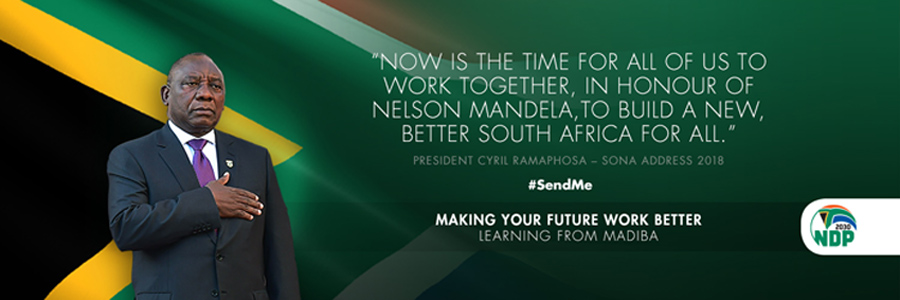
It was former Deputy Chief Justice Dikgang Moseneke who said: “Land is not just an issue of economic or commercial importance – it has meaning at many levels. It is very spiritual. It is in land that we bury our people, we connect and speak to our ancestors. It is land on which churches, temples and mosques are built and it is from land that we eat and survive.”
It was in this context that the National Assembly adopted a motion on land expropriation without compensation in February this year. Following this resolution, a Constitutional Review Committee has been established to consider the legal and economic aspects of expropriation without compensation.
The committee will also consider whether it is necessary to amend the Constitution to allow for the expropriation of land without compensation.
The Constitutional Review Committee must report back to Parliament by 30th August 2018.
According to a recent land audit report less than 4 percent of private rural land and less than 7 percent of private urban land is owned by Black South Africans.
Since 1994, the democratic government has embarked on a series of interventions to advance land reform, including restitution, redistribution and tenure reform.
While more than 3 million hectares of land was restored between 1995 and 2014, the land audit report into private land indicates that whites still own around 72 percent of the farms owned by individuals, coloureds 15 percent, Indians 5 percent and Africans only 4 percent.
Land is central to human existence. For millennia it has supported life, enabled the creation and development of societies and made economic activity possible.
It is fundamental to the dignity and well-being of our people. The dispossession of the land of the indigenous people of this country is therefore the original colonial sin that continues to constrain the realisation of the potential of our people.
The return of the land to those who work it is fundamental to the transformation of our society and it is critical if we are to improve the lives of the poor.
Government is committed to accelerate the pace of land reform. Government is also committed to ensuring that land distribution is done in a measured manner.
Let us refrain from occupying land illegally. Nobody has any right to invade land to violate other people’s rights. Instead let us work together to find just equitable and lasting solutions.
Land expropriation without compensation must be done within the confines of the law. We want to return the land to our people in an orderly way, in terms of our laws, in terms of our Constitution, so that everybody’s rights are protected and advanced.
We will handle this matter in the same way we have handled all difficult issues our country has had to handle.
We will always seek to do what is in the interests of our people.
Throughout this process, we need to work together, guided by the needs of the poor and landless.
A new dawn must mean we do things in a proper way, without any fraud, corruption or violating the law.
In this, the Year of Nelson Mandela, we need to work together to ensure his vision for land reform is realised. As government we are committed to the implementation of a comprehensive land reform programme that corrects the historical injustice of land dispossession, provides land to the poor in both rural and urban areas, strengthens the property rights of all, increases agricultural production and improves food security.
As I indicated in the State of the Nation Address, government will undertake a process of broad consultation to determine the modalities of the implementation of this mechanism.
All South Africans are and must participate in the debate about land and come up with solutions and proposals that will help take the country forward.
It is up to all of us to engage with one another to drive for meaningful and sustainable land reform.
There is a strong case to be made that the use of expropriation without compensation in certain circumstances to advance land reform is entirely consistent with the provisions of the Constitution.
We will need to determine, collectively, how we can implement this measure in a way that promotes agricultural production, improves food security, advances rural development, reduces poverty and strengthens our economy.
For it to serve this purpose, we will need to locate this measure within a broad and comprehensive land redistribution and agricultural development programme.
It is our collective responsibility to use the provisions of the Constitution more effectively and more directly to drive land reform with greater urgency and purpose. We should not reduce the enormous task of land reform to a debate on expropriation without compensation.
During the process of consultation and engagement, we must review the full extent of our land reform programme since 1994, identifying where there have been shortcomings and undertaking measures to strengthen policies and programmes.
This is an inclusive process one that requires responsibility and maturity from all South Africans.
Did you know
The Joint Constitutional Review Committee set up to review Section 25 of the Constitution to make it possible for the state to expropriate land without compensation, will soon start on an extensive public participation process.
The committee will publish advertisements for oral and written submissions from the public. The public will have a month to respond after which the committee will visit three to four districts or local municipalities per province for public hearings.
The public hearings are proposed to start on 8 May 2018 in Limpopo.
SA, Zambia take bilateral relations to next level
SA, Zambia take bilateral relations to next level Londekile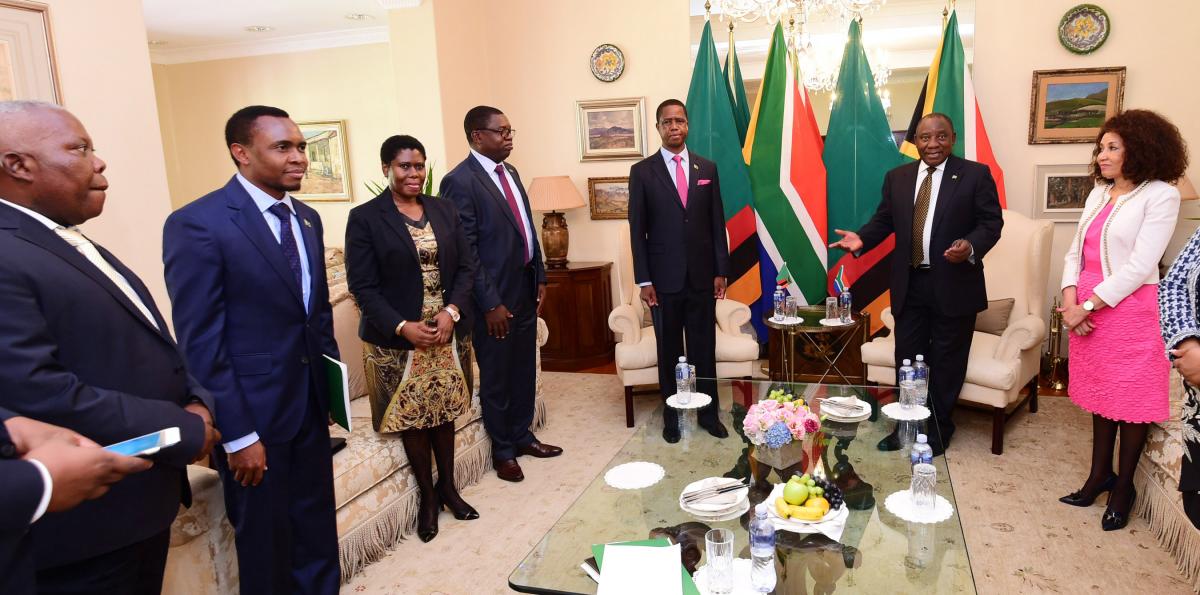
The commitments were made between President Cyril Ramaphosa, chair of the Southern African Development Community (SADC) and Zambian President Edgar Chagwa Lungu during a courtesy visit.
Zambia is set to take over from Angola as the incoming chair of the Organ on Politics, Defence and Security Co-operation.
The meeting formed part of President Ramaphosa’s current round of consultations with leaders of SADC member states. President Ramaphosa recently visited Angola, Namibia and Botswana.
“Historic relations between South Africa and Zambia were concretised when the African National Congress established its headquarters in Lusaka during our shared struggle for liberation. This led to the existing deep and solid bonds of friendship between the peoples of South Africa and Zambia,” said President Ramaphosa.
Structured bilateral co-operation between South Africa and Zambia formerly took place under the framework of the Joint Commission for Co-operation (JCC), which was signed on 18 October 2005.
During the second session of the JCC held in Zambia from 9 to 11 October 2017, the two countries agreed to elevate the JCC to a Bi-National Commission (BNC). South Africa is expected to host the inaugural session of the BNC in 2018.
See the benefits of regular eye tests
See the benefits of regular eye tests Estelle GreeffPreventative eye care can help you stop glaucoma in its tracks.
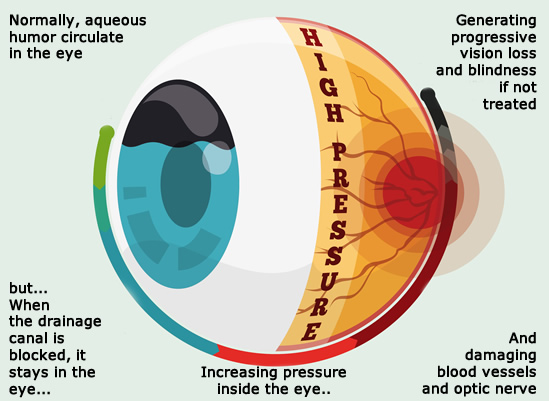 Glaucoma is a group of diseases that result in damage to the eye’s optic nerve. Glaucoma is generally related to a high eye pressure. Damage to the optic nerve initially results a decreased vision and may eventually lead to blindness.
Glaucoma is a group of diseases that result in damage to the eye’s optic nerve. Glaucoma is generally related to a high eye pressure. Damage to the optic nerve initially results a decreased vision and may eventually lead to blindness.
“Vision lost as a result of glaucoma usually cannot be recovered. Early diagnosis and careful lifelong treatment can help prevent further visual damage. If you have been diagnosed with glaucoma, ensure you use your medications correctly. See your eye surgeon in order to monitor the disease,“ said MEC Ramokgopa.
The department observes
“In its early stages, glaucoma usually has no symptoms, which is what makes it so dangerous. By the time you notice problems with your sight, the disease has progressed to the point that irreversible vision loss has already occurred and additional loss may be difficult to stop,” said MEC Ramokgopa.
Glaucoma facts
Glaucoma occurs in people of all ages, from children to older adults. It is more likely to develop in people who are over 35 years old, very near-sighted, diabetic, with enlarged cataracts and or eye disease.
It may also be inherited, as relatives of glaucoma patients are more likely to develop glaucoma themselves.
According to the Health Department, elevated intraocular pressure is considered the most important risk factor. However, glaucoma may occur even with normal readings.
A disturbed vascular regulation of the vessels supplying blood to the optic nerve head in the eye can result in glaucoma.
People with low blood pressure or general circulatory disturbances are particularly at risk. A history of glaucoma in the family requires regular examinations at all ages, not just from the age of 40 onwards.
The Gauteng Health Department said in the previous financial year it performed 678 glaucoma surgeries.
“Have your eyes tested every second year. Early detection, correct medication and proper management will prevent blindness due to glaucoma,” advised MEC Ramokgopa.
The Constitution and you
The Constitution and you Estelle GreeffAs we celebrate Freedom Month, Vuk'uzenzele has summarised the constitution to detail how each chapter impacts your life.
What does our Constitution provide for?
 Chapter 1
Chapter 1
Contains the founding provisions and provides that the Republic of South Africa is one sovereign democratic state founded on the following values: human dignity, non-racialism and non-sexism and the supremacy of the Constitution and the rule of law.
 Chapter 2
Chapter 2
Contains the Bill of Rights which is the cornerstone of South Africa’s democracy. It enshrines the rights of all people in South Africa and affirms the democratic values of human dignity, equality and freedom.
 Chapter 3
Chapter 3
Unpacks the organs of government. In the Republic, government is constituted as national, provincial and local spheres of government which are distinctive, interdependent and interrelated.
 Chapter 4
Chapter 4
Defines the structure of Parliament, the legislative branch of the national government.
 Chapter 5
Chapter 5
Outlines the structure of the national executive and the powers of the President. The President is the Head of State and head of the national executive and must uphold, defend and respect the Constitution as the supreme law of the Republic; and promote the unity of the nation and that which will advance the Republic.
 Chapter 6
Chapter 6
Establishes the nine provinces of South Africa and defines the powers and structure of the provincial governments.
 Chapter 7
Chapter 7
Sets out the guideline for local government and its municipalities.
 Chapter 8
Chapter 8
Unpacks the courts and administration of justice through the Judicial System and the Judicial Authority.
 Chapter 9
Chapter 9
Highlights the State institutions that strengthen constitutional democracy in the Republic such as the, Public Protector, South African Human Rights Commission and others.
 Chapter 10
Chapter 10
Highlights public administration that must be governed by the democratic values and principles enshrined in the Constitution.
 Chapter 11
Chapter 11
Establishes structures for civilian control of the Defence Force, the Police Service and the intelligence services.
 Chapter 12
Chapter 12
Recognizes the status and authority of traditional leaders and customary law, subject to the Constitution.
 Chapter 13
Chapter 13
Deals with public finance. It establishes a National Revenue Fund, from which money may be appropriated only by an act of Parliament, and Provincial Revenue Funds, from which money may only be appropriated by an act of the provincial legislature.
 Chapter 14
Chapter 14
Deals with transitional and incidental provisions. In particular, the first part deals with international law, providing that existing agreements binding South Africa will continue to bind it, and that new agreements (except those of a technical nature) will only be binding once approved by Parliament.
This month in history
This month in history LondekileThe first weather forecast for the Union is issued
Monday, 15 April 1912
After the amalgamation of the weather services of the four provinces on 1 April 1912, the first weather forecast for the Union of South Africa as a whole was issued by AG Howard of the Union Weather Service (UWS) from the branch office in Cape Town a few days later. The forecasting service was moved to Pretoria in 1926 and housed on the veranda of the weather office at 271 Schoeman Street.
During the Second International Polar Year Project (1 August 1932 - 31 August 1933) the UWS rendered valuable assistance in simultaneous meteorological observations from a network of stations undertaken on an international basis.
Source: www.sahistory.org
Top educator makes maths simple
Top educator makes maths simple lebangThe knowledge that you need maths for the simplest things in your life underpins the teaching principles of the country’s top mathematics educator.
A top maths teacher said her secret to ensuring that her students pass with flying colours is making the subject part of their daily lives.
Mishael Matonhodze is a grade eight mathematics teacher at Witbank High School in Mpumalanga. She was crowned the best maths educator in the country at the National Teachers Awards held recently at the Sandton Convention Centre.
“I try my best to link it to their everyday experiences and interactions. I use examples that they can relate to and make them appreciate maths as an essential part of life in general,” said Matonhodze.
One of the examples that Matonhodze shared is when she asked her pupils to measure how long it takes to wake up and go to school.
“When my learners make these predictions they are incorporating speed, distance and time; there’s so much one can unravel to show the maths that happens daily.”
She added that the pass rate of her learners is close to 99 percent, with one or two learners needing that extra push to get it right.
Matonhodze said building a solid foundation in mathematics is crucial.
"I cannot emphasise enough the importance of a strong foundation of concepts because if it doesn’t exist, then you have nothing to build on.”
One of the things that she finds assists learners is providing enough time to practice through the introduction of the workbook often referred to as the blue book.
Excellence in teaching mathematics
Being recognised for excellence was an overwhelming feeling for Matonhodze.
“It felt really great and humbling at the same time. I still cannot believe that I won.”
She won Renault Kwid car, a home office solution that included a laptop, printer, projector, furniture, tablet, a Vodacom smart phone (N8) and airtime voucher.
She advised other teachers to continue imparting the valuable knowledge they possess to the future generations of South African.
“Do this with passion and enthusiasm. It is not easy but you can make a difference and help ensure that our future is in safe hands.”
Understanding sign language enables communication
Understanding sign language enables communication lebangCommunication between the patient and medical health professional is essential for a correct diagnosis to be made and appropriate treatment to be provided.
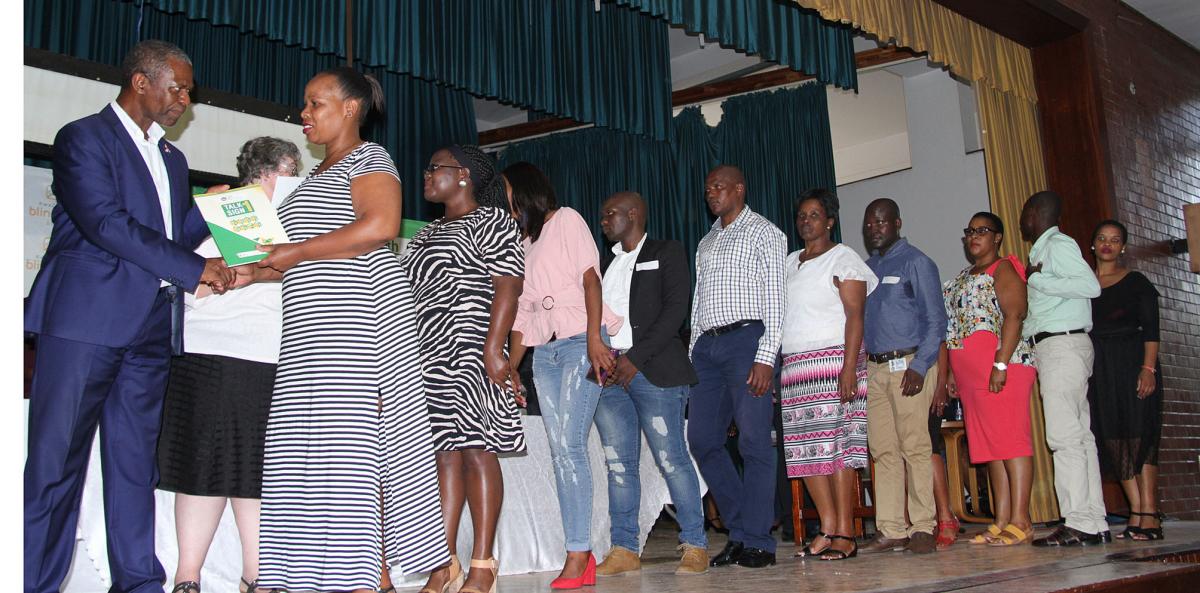 More than 1 000 healthcare practitioners from KwaZulu-Natal (KZN) have been trained in signed language as part of government’s effort to improve service delivery to all citizens.
More than 1 000 healthcare practitioners from KwaZulu-Natal (KZN) have been trained in signed language as part of government’s effort to improve service delivery to all citizens.
The 1 100 professionals train-ed to use signed language include medical officers; professional nurses; clinical nurse practitioners; nursing assistants; public relations officers; pharmacists and pharmacy assistants; therapists; emergency medical services personnel as well as administrative clerks and information desk consultants.
KZN Health MEC Dr Sibongiseni Dhlomo, who is a qualified sign language practitioner himself, said direct communication between the healthcare worker and the patient helps to maintain and restore dignity as well as confidentiality as required by the Patients’ Rights Charter.
“The initiative will help ensure that doctor-patient confidentiality is not compromised. Healthcare workers can only give accurate diagnosis and therapy when they fully understand what their patients are complaining about,” he said.
The MEC added that institutions in KZN will soon put out signs indicating that the institutions are sign language user friendly.
“The reality of the matter is that persons with disabilities have the same health needs as people without any disability,” said Dr Dhlomo.
Ntombenhle Sibiya (37) is one of graduates of the signed language course. She has been a nurse for six years and says language barriers between her and her deaf patients have always been a challenge.
Last year, with the assistance of the Department of Health, she enrolled for a course in sign language. Now she is one of over 1 100 healthcare workers who received certificates in sign language
“I felt that it was important that we actually know it in order for us to better communicate and provide health care,” said Sibiya.
MEC Dhlomo said they have trained those who are in front-line services, the clerks and other reception areas. Most of them are now trained in this process here and there.
“One day we will drive this campaign to find that all our health care professionals in the province have got this training,” he said.
The newly trained staff will be dispatched across the province, with nurses conveying a whole new meaning to their patients in the form of sign language.
